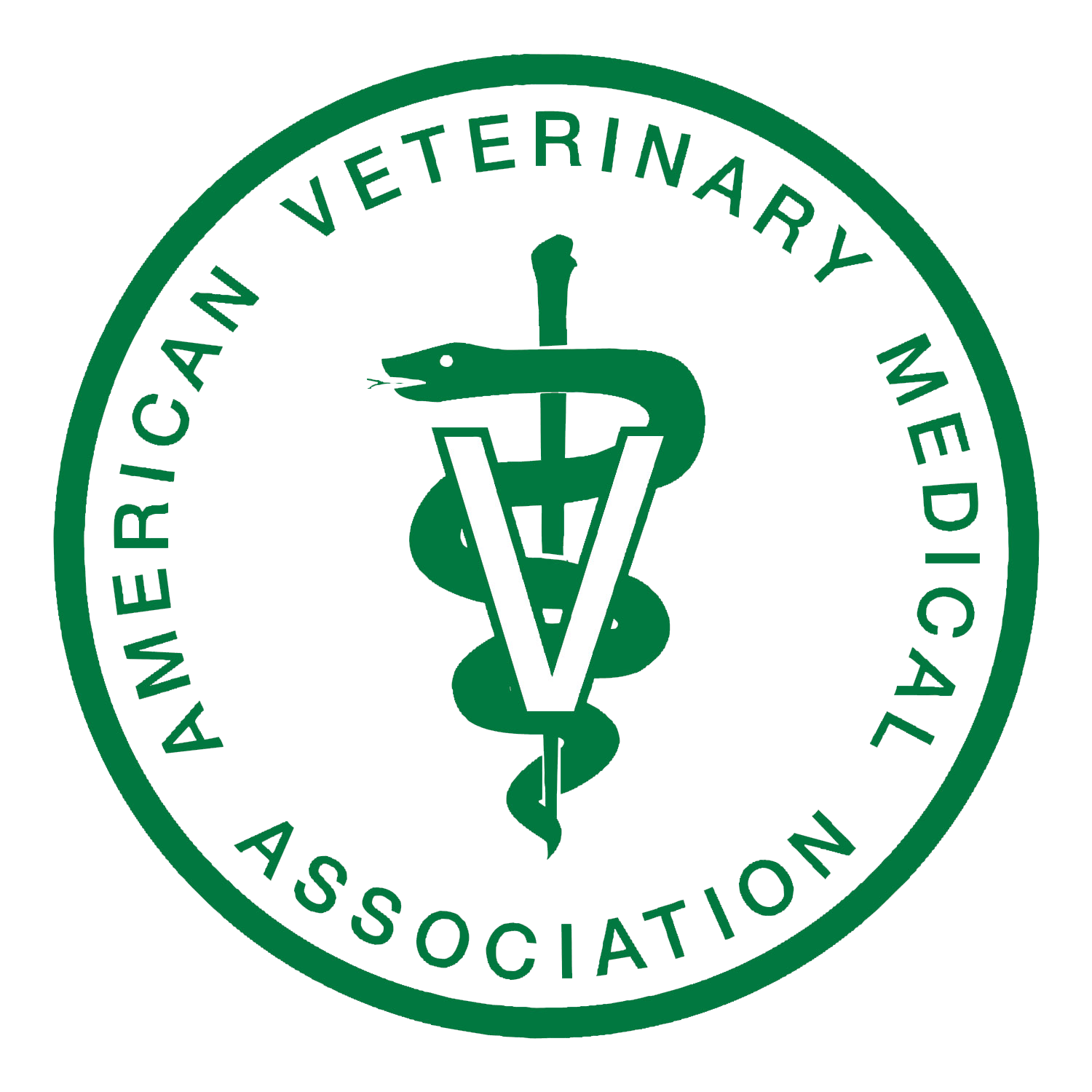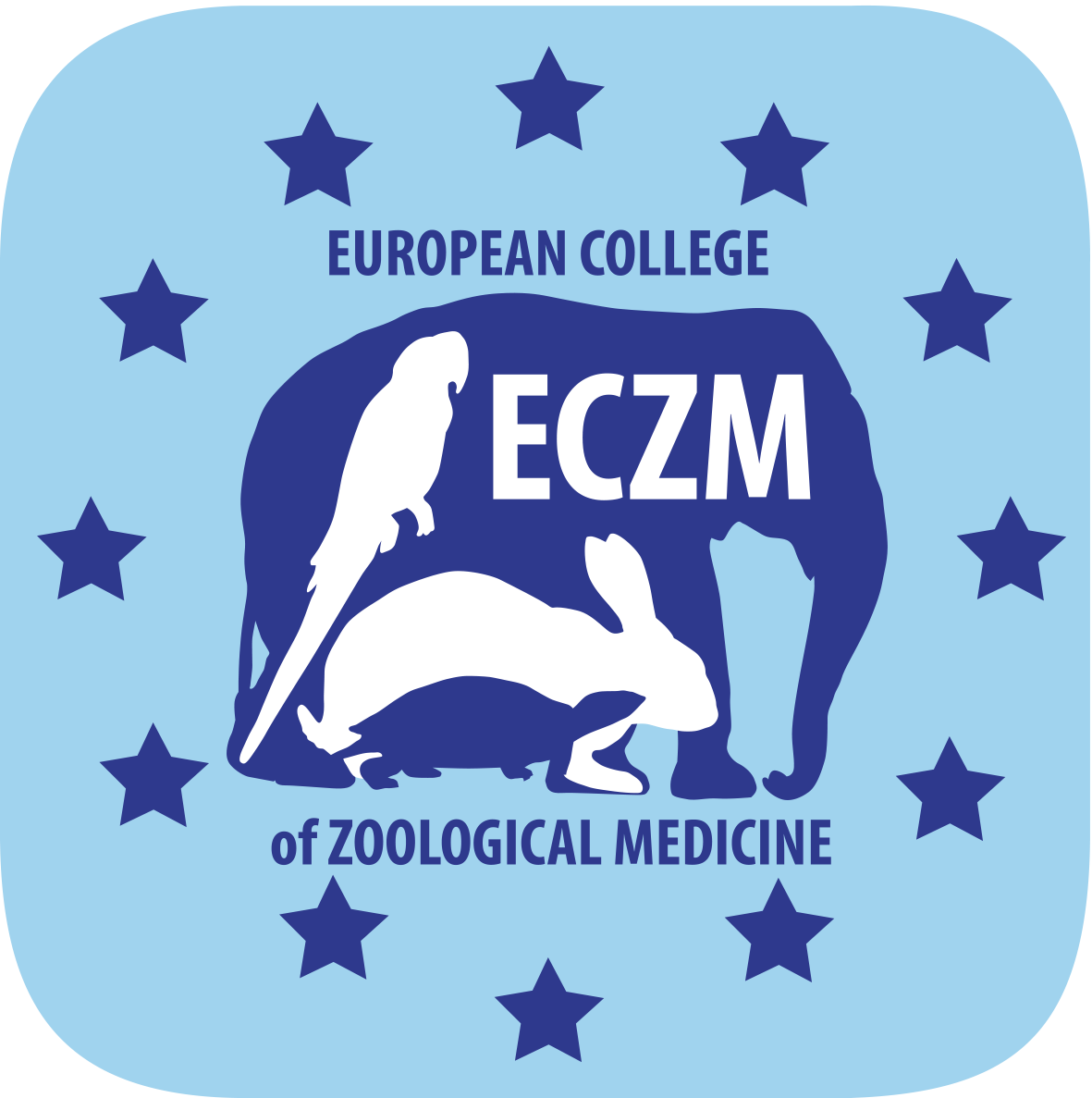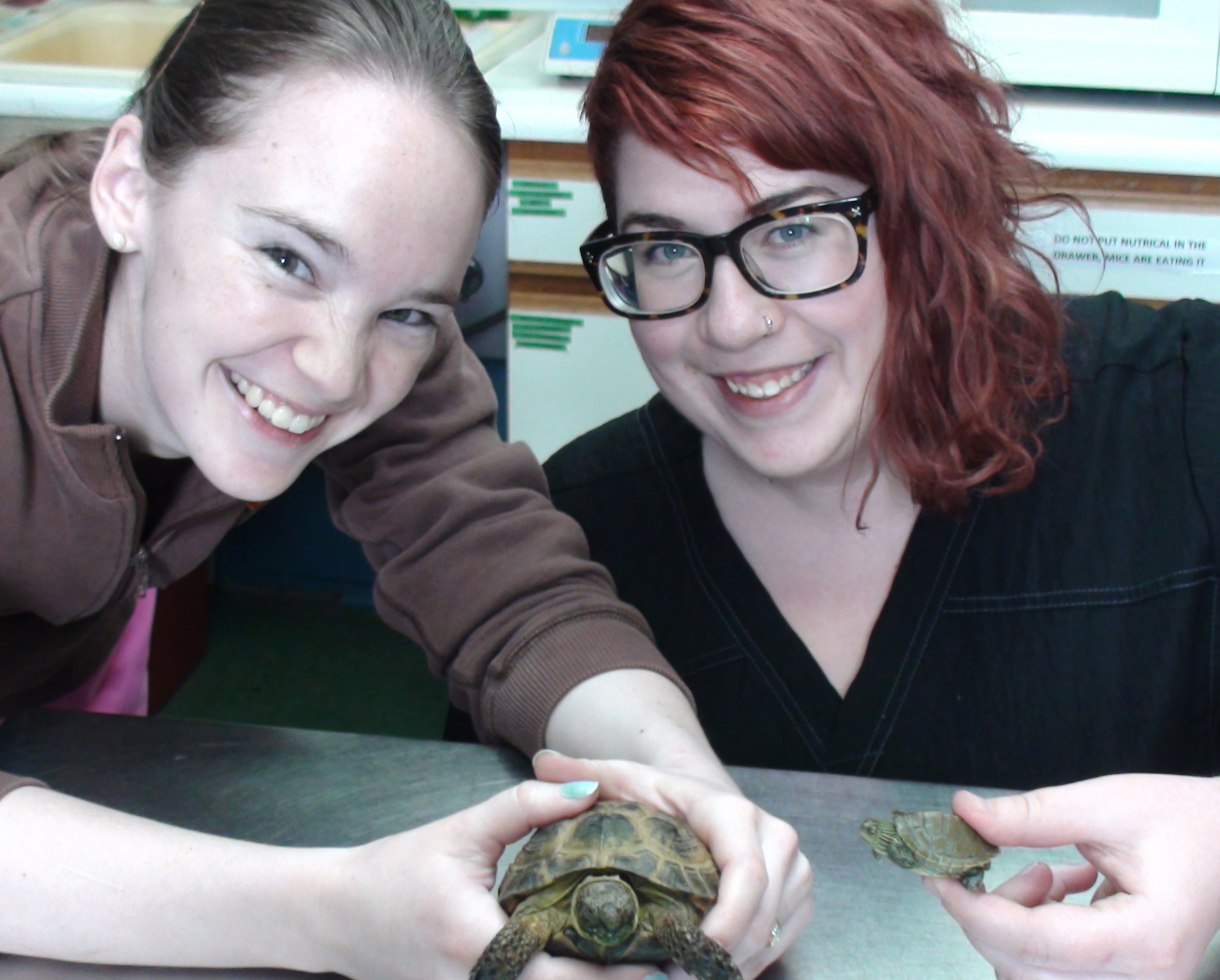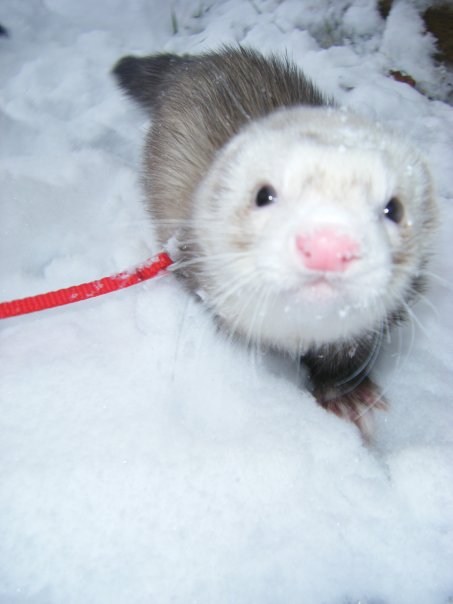Exotic pet ownership and veterinary care were the focus of a recent AVMA article! Dr. Lennox and many other colleagues were featured in this article from this months Journal of the American Veterinary Medical Association (AVMA). Be sure to click this link to read the article and see a few pictures from the clinic!
So long, Dr. Goldstein!
Dr. Goldstein will be finishing her one year avian and exotic animal internship with us next week. We will really miss her exuberant personality and positive attitude! Before she leaves, she wanted to share the following:
 So long until we meet again, AEAC! It has been an exciting and stimulating intern year. I learned so much from all of the doctors and staff and I can’t wait to take my skills to Pittsburgh. With the support of everyone at the clinic, I have improved my surgical technique and developed the ability to clinically evaluate patients, recommend and perform diagnostic tests and manage multiple cases at our busy exotics practice. It has been an absolute pleasure to work with the clientele at AEAC. We have such devoted owners that are
So long until we meet again, AEAC! It has been an exciting and stimulating intern year. I learned so much from all of the doctors and staff and I can’t wait to take my skills to Pittsburgh. With the support of everyone at the clinic, I have improved my surgical technique and developed the ability to clinically evaluate patients, recommend and perform diagnostic tests and manage multiple cases at our busy exotics practice. It has been an absolute pleasure to work with the clientele at AEAC. We have such devoted owners that are 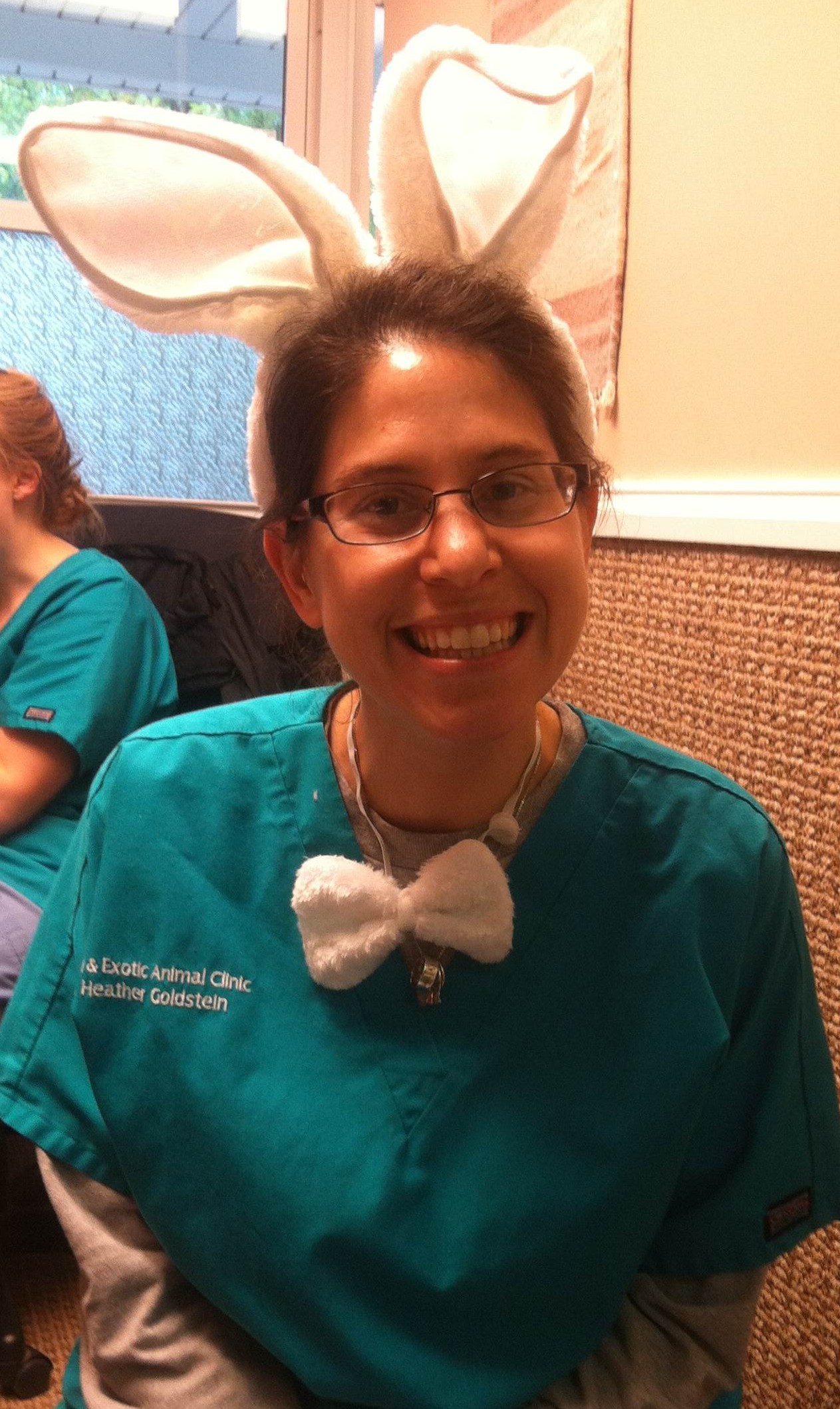 invested in their pets’ care, which allowed me to grow as a doctor and perform high quality medicine. Before starting this internship, I had never asked a bird to step-up or syringe fed a rabbit. With our patient and kind staff, the guidance of Dr. Lennox and Dr. Lee,
invested in their pets’ care, which allowed me to grow as a doctor and perform high quality medicine. Before starting this internship, I had never asked a bird to step-up or syringe fed a rabbit. With our patient and kind staff, the guidance of Dr. Lennox and Dr. Lee, 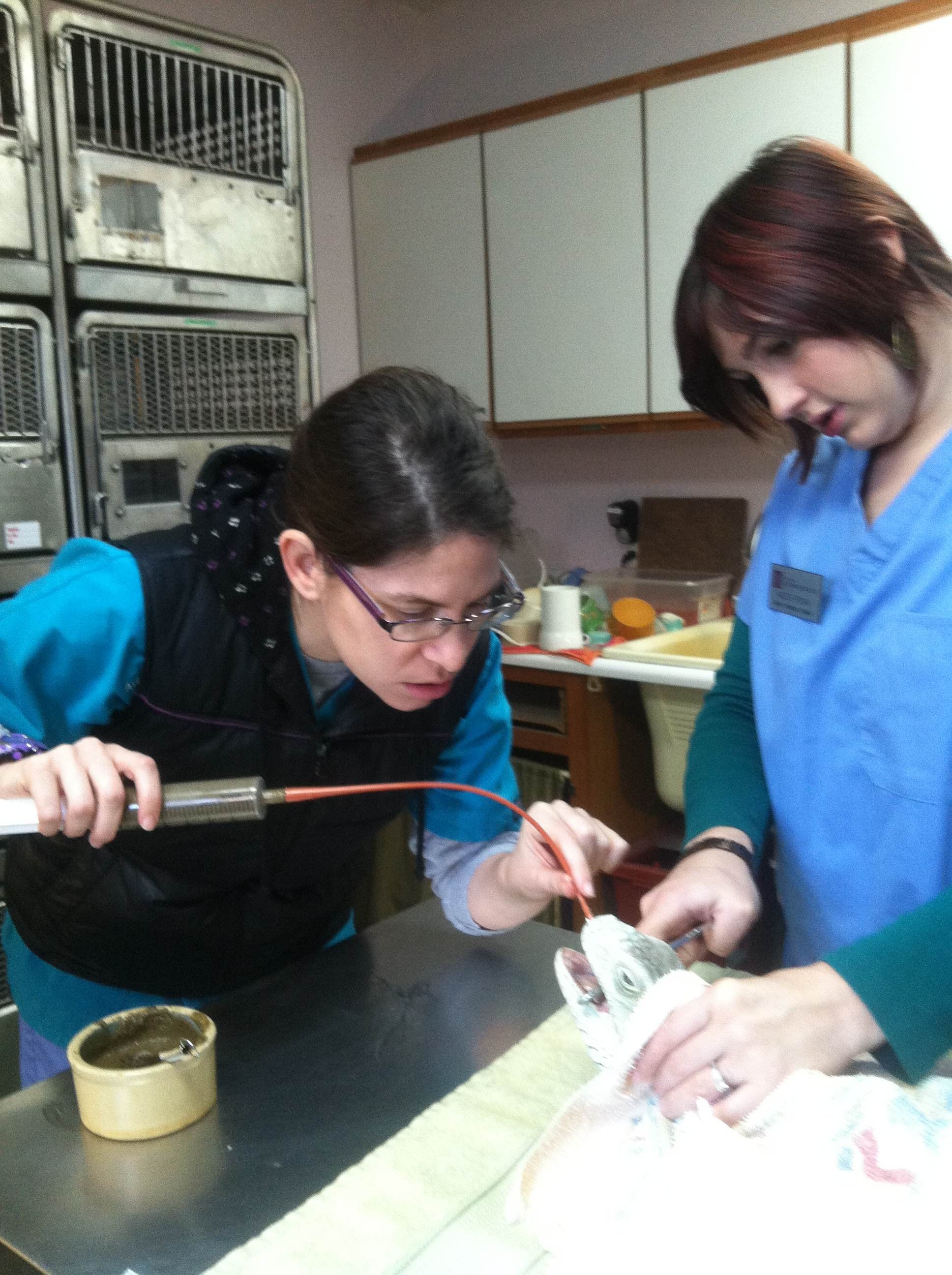 and our caring owners, I gained invaluable experience in working with exotics that I will utilize for the rest of my career. I could not be more grateful to have met and worked with all of you and I will miss you all very much. Enjoy the summer and give Dr. Swisher, the new exotic mammal resident, a warm welcome to the team in July!
and our caring owners, I gained invaluable experience in working with exotics that I will utilize for the rest of my career. I could not be more grateful to have met and worked with all of you and I will miss you all very much. Enjoy the summer and give Dr. Swisher, the new exotic mammal resident, a warm welcome to the team in July!
Dr. Lennox is awarded European College of Zoological Medicine Specialty in Small Mammals
This month Dr. Lennox was awarded another exotic animal specialty title, from the European College of Zoological Medicine, in the category Small Mammals. This is Dr. Lennox's third exotic animal medicine specialty degree. Similar to the American Board of Veterinary Practitioners (ABVP), this specialty focuses on improving the quality of exotic animal medicine and surgery:
"The European College of Zoological Medicine was established to make further progress in research and practice to benefit health and well-being of free-ranging and captive non-domesticated animals. The ECZM invests efforts to establish and maintain high standards of training that will lead to recognition as European Veterinary Specialist in Zoological Medicine. Certification increases prestige of the profession and results in more competent zoological veterinary medicine service to associated institutions and public parties/entities. "
For more information, see: http://www.eczm.eu/public/introduction.asp and www.abvp.com
If you'd like to read more about exotic animal medicine specialties, go here
The Story of Arrow the Rabbit
 Every once in a while me meet our patients in unusual ways. This male rabbit was found outside, with no history, and no idea who his owner might be.
Every once in a while me meet our patients in unusual ways. This male rabbit was found outside, with no history, and no idea who his owner might be.
He had the great misfortune of being caught in a live trap, and then shot by someone with an arrow. Fortunately the arrow did not kill him, but the impact fractured his rear leg beyond repair.
Indiana House Rabbit rescued him and volunteers brought him in to the clinic right away. Intern Dr. Heather Goldstein examined him, and provided antibiotics and pain relief. A few hours later, he was in surgery for leg amputation (and neuter) by resident Dr. Amber Lee.
He's now recovering very well, and adjusting to life on three legs. Indiana House Rabbit volunteers will now be taking over his care and are asking for donations towards his medical bills. Eventually, IHRS is hoping to place him with a family that will be sure he doesn't go roaming outside again! After all, he doesn't have any more extra body parts he can spare!
If you would like to contribute towards Arrow’s medical bills, you can contact the Indiana House Rabbit Society or you can contact us directly at 317-879-8633.
So You Want Some Backyard Chickens?
Avian and Exotic Animal Clinic will host our first ever Backyard Chicken Seminar on Saturday, May 24th, from 1-4 PM.
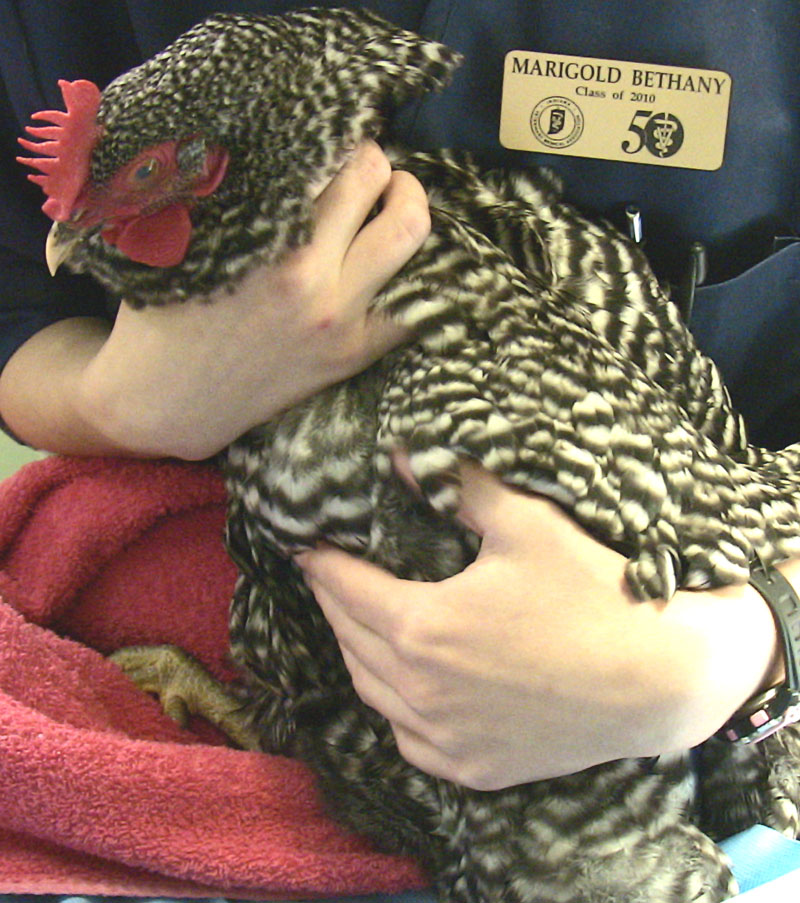 Join us for an informative afternoon of talks and discussions on the ins and outs of pet and backyard poultry. We will chat about housing and enrichment, biosecurity, basic medical care and much more. Invited guests include Dr. Pat Wackenell and Dr. Yuko Sato from Purdue University, and Drs. Lennox and Lee from the Avian and Exotic Animal Clinic.
Join us for an informative afternoon of talks and discussions on the ins and outs of pet and backyard poultry. We will chat about housing and enrichment, biosecurity, basic medical care and much more. Invited guests include Dr. Pat Wackenell and Dr. Yuko Sato from Purdue University, and Drs. Lennox and Lee from the Avian and Exotic Animal Clinic.
Sponsored by Kern Kirtley and Herr Feed, and Central Indiana Organics http://www.centralindianaorganics.com
To register, or for more information, contact us at exoticvetclinic@gmail.com. Hurry, as spaces are limited!
Hospital Pet Bird Abba Earns Right to Practice Veterinary Medicine
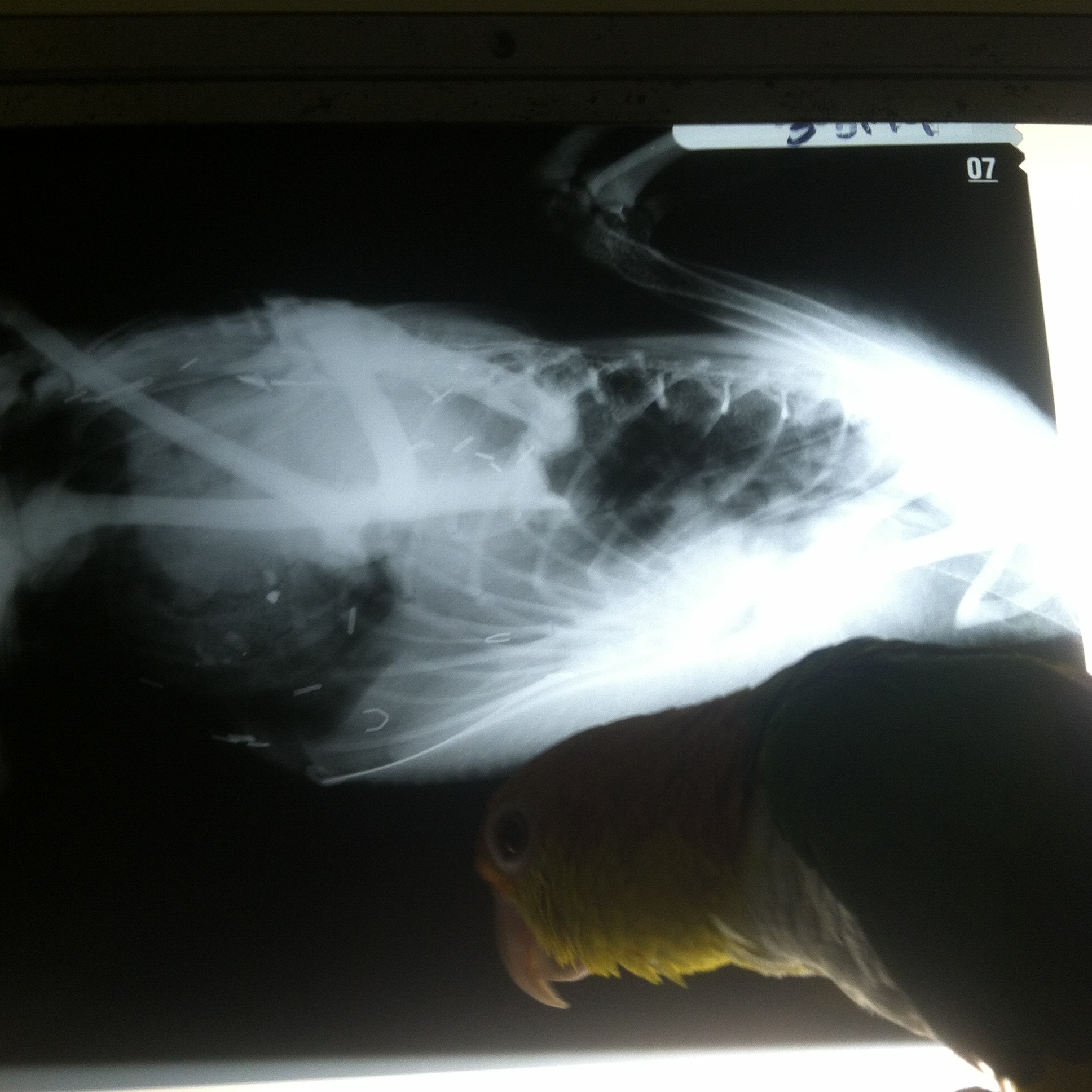 Outside experts at Purdue University have concluded that Abba the Caique has actually absorbed enough exotic animal medicine during her time at the Avian and Exotic Animal Clinic that she is actually qualified to practice exotic animal medicine.
Outside experts at Purdue University have concluded that Abba the Caique has actually absorbed enough exotic animal medicine during her time at the Avian and Exotic Animal Clinic that she is actually qualified to practice exotic animal medicine.
"This was actually a complete shock to us," says Angela Lennox, DVM, owner of the Avian and Exotic Animal Practice. "Considering I had to attend 4 years of undergraduate studies, 4 years of actually veterinary school, and on top of that spend many years completing two exotic animal boards specialties, it's amazing she could pick it up so quickly. She is really one bright bird."
 Office manager Corina Lennox added, "Yeah that was a surprise. We didn't even know she had applied. Now I have to order her new business cards."
Office manager Corina Lennox added, "Yeah that was a surprise. We didn't even know she had applied. Now I have to order her new business cards."
The staff looks forward to working with Dr. Abba over the next few months.
"Obviously there are some size limitations," explained Mandy Maddamma, RVT, "she's obviously not going to be able to work on pot belly pigs as they would likely completely squish her. She is going to start out on little geckos and things like that."
Dr. Abba is understandably excited about her new role, and expressed this by imitating the microwave, the doorbell, and one of the blood analyzer machines.
Outdoors We Go!
 We strongly recommend most exotic pets get some outdoor time and exposure to UV light. We already know how good UV light is for reptiles, but some studies are suggesting UV light is great for birds and mammals, too. While UV lights can be useful, nothing beats the real sun, not to mention the benefits of fresh air and novel surroundings (remember, novel surroundings may be too stressful for some especially nervous pets).
We strongly recommend most exotic pets get some outdoor time and exposure to UV light. We already know how good UV light is for reptiles, but some studies are suggesting UV light is great for birds and mammals, too. While UV lights can be useful, nothing beats the real sun, not to mention the benefits of fresh air and novel surroundings (remember, novel surroundings may be too stressful for some especially nervous pets).
Other benefits of outdoor time for rabbits and other grazers is the ability to pull up and eat real grass and weeds (untreated of course).
So how do we acclimate out pets to outdoors after a whole winter of steady temperatures?
Start with small outdoor sessions of 10-15 minutes when temperatures are at least in the 60's.
This past Monday and Tuesday (the day before the snow came back again) our bird Abba went into her outdoor cage for the first time of the year and she loved it! We watched her carefully for signs she was too cold, such as not playing, staying by the door, or fluffing up her feathers. As the temperature goes up and she adjusts, she spend more and more time out there!
As always, be sure pets outdoors are safe from escape, predators such as dogs, cats, and hawks flying overhead, and be sure there is plenty of water and shelter from the sun should it get too hot.
Our First Seminar
How Can It Be? Baby Wildlife Season Already?
We would have thought with the severe cold weather the native Indiana wildlife would have held on for a while before making lots of wild babies, but no such luck! Look at what just came into our clinic this week (with more snow predicted for the weekend)! Can you tell what kind of babies these are?
These young squirrels were accidental dislodged by a tree trimming company and brought in to our clinic by Indianapolis Animal Care and Control. Later that same day, another baby squirrel was brought in by a Good Samaritan! All of the baby squirrels are already safe and warm with one of our licensed wildlife rehabilitators!
 With spring apparently around the corner, we'd like to remind everyone about what to do if you encounter injured or orphaned wildlife. Please click the here for more information. In the majority of cases, wildlife you encounter doesn't actually need help. When they do, we are here to help.
With spring apparently around the corner, we'd like to remind everyone about what to do if you encounter injured or orphaned wildlife. Please click the here for more information. In the majority of cases, wildlife you encounter doesn't actually need help. When they do, we are here to help.
As always, we do not charge anything for the care of wild animals, but we are always in need of donations! Check out our wildlife page for a full list of items we could use to help with their care.
Happy Spring!
Our Wonderful Student Externs
 We love to teach at the Avian and Exotic Animal Clinic. There is always a student at the clinic learning about exotic animals and veterinary medicine. Sometimes there are visiting veterinary students, technician students, and we even have high school and middle school students that want a taste of what it’s like to be a veterinarian. Not only do we enjoy having the extra help but one of the best parts of our job is educating all of our visitors.
Veterinary students come to the clinic for their 4th year rotations. These students focus on improving handling and basic techniques while learning the basics of how to practice exotic pet medicine when they graduate school. They help us with treatments, triage wildlife cases, and assist with appointments and surgeries. We also discuss cases and a variety of topics that are relevant to exotic pet medicine to stay up-to-date on the latest research.
We love to teach at the Avian and Exotic Animal Clinic. There is always a student at the clinic learning about exotic animals and veterinary medicine. Sometimes there are visiting veterinary students, technician students, and we even have high school and middle school students that want a taste of what it’s like to be a veterinarian. Not only do we enjoy having the extra help but one of the best parts of our job is educating all of our visitors.
Veterinary students come to the clinic for their 4th year rotations. These students focus on improving handling and basic techniques while learning the basics of how to practice exotic pet medicine when they graduate school. They help us with treatments, triage wildlife cases, and assist with appointments and surgeries. We also discuss cases and a variety of topics that are relevant to exotic pet medicine to stay up-to-date on the latest research.
The technician students who shadow at AEAC learn how to apply their knowledge from school to an exotic medicine setting. Our experienced technicians teach students about animal husbandry for all the species we see at the clinic. They go over how to take histories for appointments, anesthesia monitoring, and basic handling and technical skills.
So, if you see a new face around the clinic, he or she may be a visitor coming to learn about the pets that you love and how to provide them with the best possible care. We enjoy teaching everyone about exotics because educating people about exotic medicine and exotic pet care makes our patients happy and healthy.
Coming Up This Year
Yes, it’s still winter, but we can look forward to a few bright exotic-related events in the upcoming months. We will post more as details become available.
 This year’s conference features our own Dr. Amber Lee and Caity Sickafoose, RVT who will speak on exotic pet-related issues for pet sitters.
This year’s conference features our own Dr. Amber Lee and Caity Sickafoose, RVT who will speak on exotic pet-related issues for pet sitters.Here We Go Again!
 We recommend our owners have at least the following: a back up source of warmth should the power go out in cold weather, a source of bottled water, an emergency baby sitting site, and enough easily accessible carriers for each and every pet should you have to leave the premises immediately.
We recommend our owners have at least the following: a back up source of warmth should the power go out in cold weather, a source of bottled water, an emergency baby sitting site, and enough easily accessible carriers for each and every pet should you have to leave the premises immediately.To Clip or Not to Clip (wings, that is)…..That is the Question!
Bird owners have a choice when it comes to clipping wings. Many choose to clip to prevent flight and avoid collision injuries and accidental escapes outdoors. Others choose to take precautions and allow flight in the home in a protected, safe area. There are advantages and disadvantages to either approach:
Wing clip
Birds are obviously safer from collisions and escape. However, these birds are denied the fun of flying, and terrific exercise and enrichment benefits. Some birds are just better pets when they can’t fly wherever they want. It may be difficult to completely bird-proof the home from dangers such as the hot stove, toilets, large glass windows or ceiling fans. Birds confined to one area make less mess!
Free flight
The free-flighted bird gets to take advantage of a natural behavior that’s good for the body and for the mind as well. Owners can carefully create a safe flying space free of dangers. However, accidental escapes happen, and the free-flighted bird that gets out may keep flying and never come back (we’ve seen that happen personally and it’s very disappointing). Free flighted birds may be leaner and have less risk of some of the diseases that come with inactivity, including heart disease.
Owners should choose carefully based on what’s reasonable for them and their situation. We can help you discuss the options and decide what’s right for your bird!
Where is our Ferret Distemper Vaccine?

Many of our ferret owners have heard that the Meriel company has currently stopped producing the only licensed ferret distemper vaccine, Purevax. The company states the vaccine will become available again, but gives us no clear idea of when that might be, or why production was stopped in the first place. The advantage of Purevax distemper vaccine is that it has been tested both for safety and efficacy in ferrets, and is made of only a portion of the distemper virus, meaning it can't possibly actually produce distemper disease in vaccinated animals.
Happy Thanksgiving!
Happy Thanksgiving! Our Holiday hours will be: Thanksgiving:
Wednesday 11/27: 8am-12pm
Thursday 11/28: Closed
Friday 11/29: Closed
Christmas:
Tuesday 12/24: 8am-12pm
Wednesday 12/25: Closed
Thursday 12/26: Closed
New Years:
Wednesday 1/1: Closed
We are, of course, always available for emergencies. Please call the clinic for the emergency number or click here.
Happy Holidays!
We Offer Pre-Purchase Consultations!
 Have you ever thought about coming to see the veterinarian BEFORE you buy an unusual exotic pet? This is an excellent way to be sure you understand exactly what’s involved in day-to-day care, and learn strategies to avoid and minimize illness.
The internet and pet stores are great places to start for information, but not everything you read or hear may be accurate or up-to-date. We also encourage the entire family to attend, including children who may be part of your new pet’s care. We’ll be sure everyone’s on the same page, and provide written care instructions.
Have you ever thought about coming to see the veterinarian BEFORE you buy an unusual exotic pet? This is an excellent way to be sure you understand exactly what’s involved in day-to-day care, and learn strategies to avoid and minimize illness.
The internet and pet stores are great places to start for information, but not everything you read or hear may be accurate or up-to-date. We also encourage the entire family to attend, including children who may be part of your new pet’s care. We’ll be sure everyone’s on the same page, and provide written care instructions.
Give us a call and schedule a pre-purchase consult now…best of all, they are FREE!
Wildlife Report 2013
 As the temperatures drop, the visiting birds head to warmer climates, the mammals hibernate or really slow down in activity, and all our native Indiana wildlife says a temporary goodbye to “new baby season”. This means a lot less work for our busy wildlife rehabiliators and clinic staff until next spring.
As the temperatures drop, the visiting birds head to warmer climates, the mammals hibernate or really slow down in activity, and all our native Indiana wildlife says a temporary goodbye to “new baby season”. This means a lot less work for our busy wildlife rehabiliators and clinic staff until next spring.
How can you help us and our wildlife rehabilitators? Save us those worn but still good towels, and consider a donation of heating pads, bleach, laundry detergent, or Science Diet small kibble size puppy food so our rehabilitators and staff will be ready for next spring. Or call and we’ll find out what our team needs most at the moment.
Halloween Costume Contest
 It's that time of year again! For the past several Halloweens, some of our owners have sent us photos of their pets in costumes. This time, we decided to make a contest out of it!
It's that time of year again! For the past several Halloweens, some of our owners have sent us photos of their pets in costumes. This time, we decided to make a contest out of it!
We asked everyone, via Facebook, to send us pictures of their exotic pets in costume and the staff voted for their favorites. The votes are in! First place goes to Marshmallow the guinea pig as a wizard, and second place goes to Stewie the Lion Head rabbit as a lion. They will both be receiving some Oxbow goodies! Hopefully this will become an AEAC tradition. Congrats!!
Congrats Dr Lennox!!!
 Dr. Lennox has just been named the 2013 winner of the Oxbow Exotic Mammal Health Award! According to John Miller, President and Founder of Oxbow Animal Health, this award "celebrated the work of one while honoring a collective-animal health professionals the world over, working tirelessly to advance animal health and wellbeing. We are proud to recognize this year's winner, and all those who lead, teach, learn, innovate, and advocate in the name of animals." Dr. Lennox is especially proud to receive this recognition as it is nominated by other professionals in the exotic mammal field.
Dr. Lennox has just been named the 2013 winner of the Oxbow Exotic Mammal Health Award! According to John Miller, President and Founder of Oxbow Animal Health, this award "celebrated the work of one while honoring a collective-animal health professionals the world over, working tirelessly to advance animal health and wellbeing. We are proud to recognize this year's winner, and all those who lead, teach, learn, innovate, and advocate in the name of animals." Dr. Lennox is especially proud to receive this recognition as it is nominated by other professionals in the exotic mammal field.
 The award itself is entitled "The Quest". According to Oxbow, the sculpture was designed to represent the journey taken by the animal health professional. At the heart of The Quest is a structure resembling the serpent-encircled staff of Asclepius, the Greek God of healing and the international symbol of medicine. The upward spiral also represents the quest of the veterinary professionals as they seek to fulfill the tenets of the Veterinarian's Oath. Framing the spiral are three interlocking spheres, each on symbolizing an important facet of the professional quest: to promote animal health, to advance medical knowledge, and to benefit society. We are proudly displaying The Quest in our new reception room so come check both out!
The award itself is entitled "The Quest". According to Oxbow, the sculpture was designed to represent the journey taken by the animal health professional. At the heart of The Quest is a structure resembling the serpent-encircled staff of Asclepius, the Greek God of healing and the international symbol of medicine. The upward spiral also represents the quest of the veterinary professionals as they seek to fulfill the tenets of the Veterinarian's Oath. Framing the spiral are three interlocking spheres, each on symbolizing an important facet of the professional quest: to promote animal health, to advance medical knowledge, and to benefit society. We are proudly displaying The Quest in our new reception room so come check both out!

